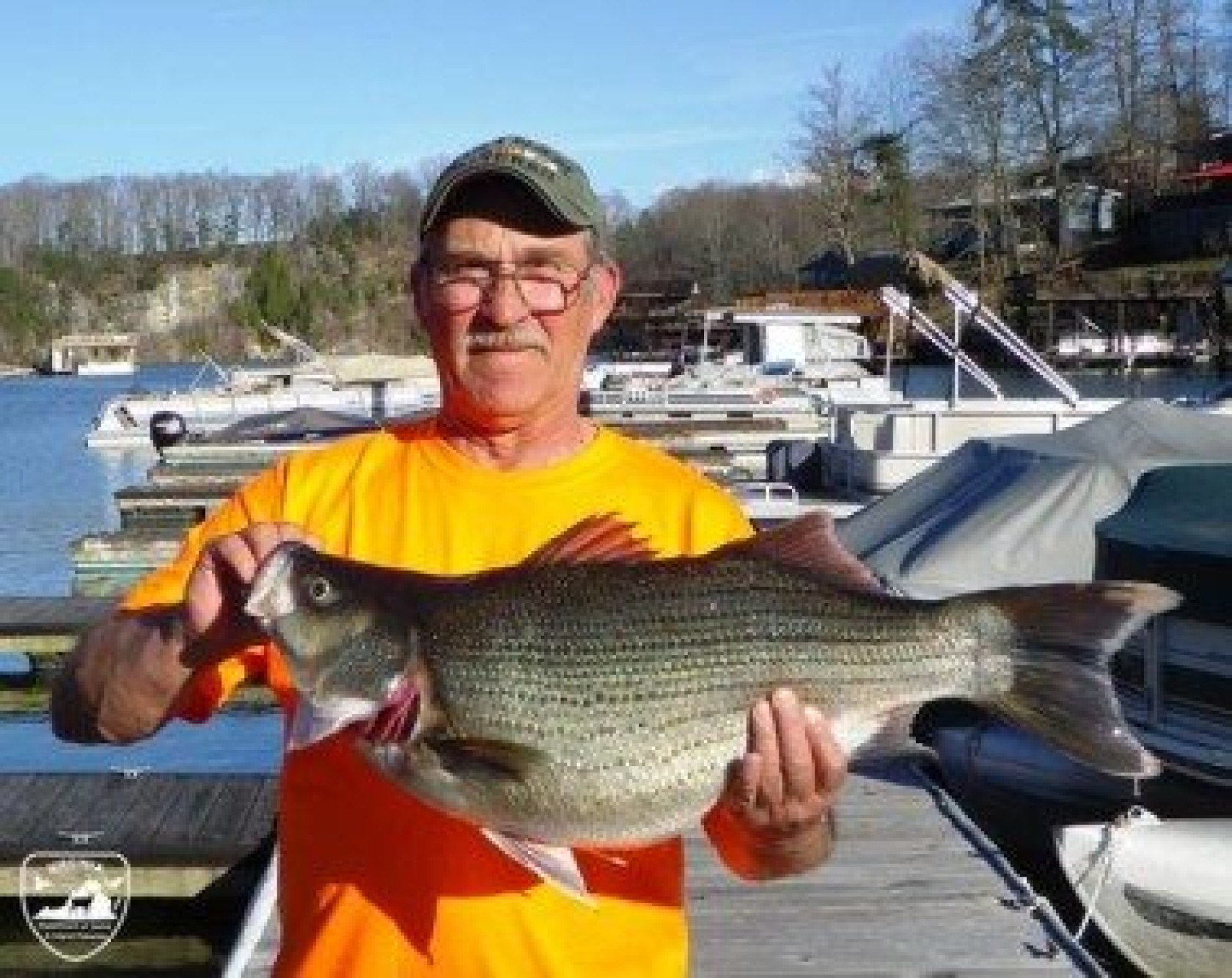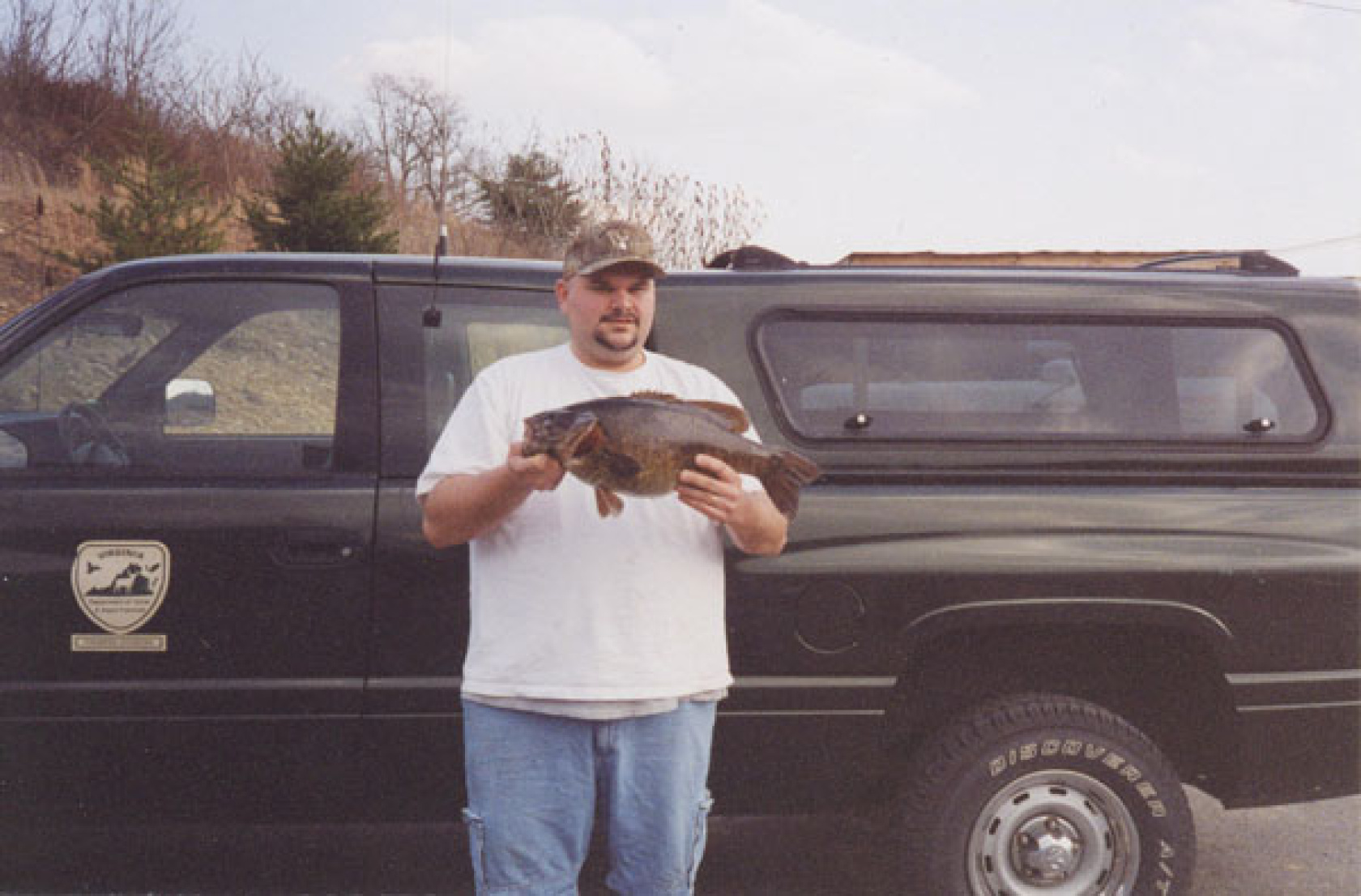Top 8 Bass Fishing Records in Virginia (Updated 2025)
Virginia doesn’t come up a lot when you talk to people about bass records, the major spots in the US tend to be around Texas, California, Georgia, Alabama, and similar states. However, Virginia does have some pretty solid bass fishing, and thanks to its proximity to the east coast, largemouth aren’t the only big boys you can go after.
Now, records are mostly a goal for anglers to reach towards, or simply something neat to look at and remind yourself of what's possible. However, for anglers who know how to look between the lines and spot bass fishing patterns or oddities, the record books can be a great learning resource.
Today, we’re going to prove that by first going over the top bass fishing records in Virginia, and then we’ll pick out some of the key points we believe most fishermen will learn something from.
Let’s get started.
1: Richard Tate: Largemouth Bass Record in Virginia
Virginia’s largemouth bass record has been held with pride by Richard Tate since 1985, and no, it’s not a massive whopper like George Perry’s or most of the other long-standing bass records. Richard’s fish is a 16-pound 4-ounce record, and it’s recorded as the largest largemouth bass caught in Virginia without any special restrictions such as tackle limits or any of that.
Compared to the records across the country, this is a fairly average size for a state-record bass. Some of the less bass-friendly states have records as low as 13 pounds, and the best spots, which we mentioned in the intro to this, get up to 22 pounds if you only consider official records.
As such, Richard Tate’s bass is one that very few anglers ever get the chance to hook into, and it’s certainly a feat worthy of the record books, in Virginia or otherwise.
Image source: Smith Mountain Lake Fishing Forums - ProBoards
2: Don Jessie: Hybrid Bass
Hybrid bass is an odd species. It's not exactly natural, but it can occur naturally in very specific conditions, as it's usually bred intentionally at a hatchery and then transferred to different lakes around the country. It's what you get when a massive striped bass manages to mate with a smaller white bass, and the result is something larger than a largemouth but not quite as massive as the 50-pound striped bass. Physical traits are a combination of both parent species.
This isn’t as popular of a species to target as largemouth, spotted bass, or Smallies, because the places you can catch them are more limited. However, along the east coast, hybrid bass fishing is a favorite among sport fishermen and weekend warriors alike.
In Virginia, Don Jessie holds the record for these unique bass. His catch was 15 pounds and 13 ounces, and it was made at Claytor Lake in 2016.
15 pounds is large for any bass outside of striped bass, but in terms of the record books, this is quite a bit behind other states that have reached past 25 pounds for hybrids. The record is also relatively new. It wouldn’t be too surprising if a lucky angler were to realize something 10 pounds heavier out of nowhere if the waterways in Virginia are maintained well enough to give the hybrids a chance. That’s a hint if you’re trying to get your name in the record books.
3: Harry G. Swauger: Roanoke Bass
Virginia has a couple of small types of bass. Most predominantly, they’re the Roanoke bass and rock bass. The most unique of the two is the Roanoke bass, and it’s not found in many other spots around the US. So, you might not be familiar with it.
First, it's not exactly a "bass" in terms of its genus and species. However, it's similar enough in appearance and behavior that it's treated as such. Technically, it's part of the sunfish family, and it's commonly no larger than adult bluegill.
Harry G. Swauger holds the current record for Roanoke bass with a 2-pound 9-ounce beauty that has held its position at the top since 2005. It was caught at Western Branch Reservoir, a spot that is known for its abundance of Roanoke bass and similar sunfish.
One thing to keep in mind with these “mini-bass" records is that the specimen on record might not actually be the largest caught in any given state. We'll talk more about this later on, but since these are treated like “throwaway” fish by serious bass anglers, and catfish anglers tend to use them as bait regardless of size, it is very possible that a bigger fish has been caught and simply tossed back or turned into cut bait.
4: Larry Ball: Rock Bass
Rock bass is a lot like Roanoke bass, but you've probably caught a few of them regardless of what part of the country you're in. They're tiny, panfish-sized bass, and they aren't given a second glance by the pro-tournament-type of angler. However, they are fun to catch on the right equipment, and you can pick up a record for them in basically every state that has them.
Larry Ball holds Virginia's rock bass record with a 2-pound 2-ounce rock bass he caught at Laurel Bed Lake in 1986. Again, the reason that the record hasn't been broken likely has a lot to do with anglers themselves instead of what the lakes of Virginia are capable of producing. However, this is close to peak-rock bass fishing.
5: Donald S. Eaton Jr: Smallmouth Bass Record
Now, we'll get back to the bass species that anglers tend to target the most. Specifically, this record is for smallmouth bass or Smallies, and they are the second most popular bass among anglers. If you've hooked into one of these tough fighters, you know exactly why.
The record for Virginia is an 8-pound 1-ounce Smallie caught at New River by Donald S. Eaton Jr in 2003. That’s around the average state record rate across the nation for Smallies, and it’s absolutely massive in comparison to what most anglers wrestle aboard their boats. However, there is room for growth, and the record certainly isn’t unbeatable.
Image source: Virginia Department of Wildfire Resources - Virginia.gov
6: Cliffton Joel Hamilton: Spotted Bass Record
Spotted bass is just about as popular as Smallies in some regions, but they're even slightly smaller on average. In Virginia, the record for spotted bass is a little weird. There are technically two records. One is extremely impressive and ranks up toward the top in the nation's average, and the other isn't quite up there.
First, the official record is held by Cliffton Joel Hamilton who caught his spotted bass at Claytor Lake in 2020. It’s a 4-pound 12-ounce bass. That’s much smaller than the nation’s average, and it might seem a bit odd that it’s a very recent record given how low it is in comparison to other states.
Well, that’s because Virginia has state record rules that haven’t been around too long. They were created and adopted in 1985, and any record before that adoption of the official rules is no longer valid. The old records are included with all the modern records, but they’re denoted and considered unofficial, now.
If they were counted, the Virginia record for spotted bass would still go to the 1976 catch of Joe Jet Friend. He caught a 6-pound 10-ounce spotted bass at Flannagan Reservoir. The problem is, Virginia’s new rules are fairly strict when it comes to the record books, and a lot of the old records simply wouldn’t meet those modern standards. It’s a good thing for sport fishing, but it means that the old records more or less have to be undermined, and the records basically restarted in 1985.
On a positive note, that means every big spotted bass you reel in is a contender to snatch the record from Cliffton.
7: James B. Davis: Striped Bass
Now, we get into the big boys. Striped bass is not like largemouth and similar species. These fish love brackish water, and they even go out to sea on occasion, allowing them to reach enormous sizes by comparison.
The Virginia record for striped bass is held by James B. Davis, and it was set at Leesville Reservoir in 2000. The fish was a whopping 53 pounds and 7 ounces.
There are two good things about this record. First, it's not a landlocked record. That means that any striped bass caught in Virginia is eligible to overtake it. In some states, the striped bass record is purely for striped bass that doesn't have access to saltwater, and that complicates things. The other good thing about it is that striped bass gets much bigger than this. Most of the other states with striped bass records have records that supersede 60 pounds. So, there's plenty of room to realistically catch the next Virginia record without needing an absolute miracle to do so.
With that being said, the record is longstanding, and striped bass isn't what Virginia is known for. So, having a bit of luck on your side won't hurt.
8: Ron Sprouse: White Bass
Previously, we covered one of the parent fish for hybrid bass, the massive, half-saltwater, half-freshwater, bass. Now, we’ll cover the other one that is small enough to make you wonder how the two mate to make hybrids.
The white bass is a freshwater and brackish water fish, and it’s about the same size as a Smallie or spotted bass on average.
Ron Sprouse holds the Virginia record for white bass with a whopping 6-pound 13-ounce white bass caught at Lake Orange in 1989. See? We told you they were exceptionally small compared to striped bass.
White bass isn't targeted nearly as much as Smallies or spotted bass, but they are still fun to tackle, and if they're in a body of water that connects to the sea via a brackish tributary, you're likely to see hybrids at some point. Still, this is a long-standing record, and it's near the peak of known white bass limits. So, breaking it will be difficult.
What Can You Learn from These Records?
There’s more to these records than just entertainment value and the history of sport fishing. You can learn a thing or two.
First, you probably noticed that this list has a diverse list of spots on it. The same river or lake doesn’t really show up twice. However, they are all high-quality fishing spots. They’re not local ponds, some farmer’s random bit of lake, or creeks right next to giant camping spaces. Besides the reservoirs, these are lakes that naturally have the room and resources to support big fish. You’ll do yourself a favor by fishing similar spots.
Another big thing to learn about record fishing is to not disregard everything besides a largemouth. If you look at the Virginia records for Roanoke and rock bass, they’re exceptionally small. Both of those species are known to grow larger, but the thing is, most fishermen toss them back. If you get a hold of a big one, try to weigh it really quick. You might just have a record-breaking fish on your hands. The same goes for the spotted bass record in Virginia. It’s quite a way behind the records in other states, and it’s very likely that any angler can hook into one bigger. However, that won’t matter if you don’t take the time to weigh it and then have it officially booked. Make sure you have your digital scale on you, and of course, don’t scoff at the lesser sought-after fish species.
Finally, you can see that some records are “easier” to beat than others. For example, the striped bass record is a good ten pounds lighter than the records in neighboring states. The striped bass don’t cut off at 55 pounds in Virginia. A bigger one just hasn’t been caught yet. If you get rid of largemouth tunnel vision and look at the records that can realistically be beaten, you can get in the record books without needing a miracle.
If you’d like to start targeting record-breaking bass of any species, BassForecast can help. We’ve created guides covering just about every aspect of fishing you can think of, and our fishing app uses high-tech systems to provide real-time, in-depth, weather analysis wherever you are, along with other information that is valuable to any fisherman.



.png)
.png)